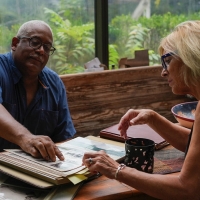SF State students win national moot court competition

Olivia Clarke and Mayuu Kashimura are the 2024 National Moot Court Champions in the Respondent’s Brief category
Two San Francisco State University students beat teams from colleges across the country to win the American Moot Court Association (AMCA) Brief Writing Competition. Olivia Clarke and Mayuu Kashimura’s brief prevailed over more than 200 others submitted by students from schools like Yale, Clemson and UC Berkeley.
“I was in shock when I first found out we won,” said Kashimura, a Political Science major who expects to graduate next May. “I remember calling Olivia as soon as I found out, and we were screaming.”
“I was ecstatic when I found out the news,” said Clarke, who’ll earn her Political Science degree this spring. “It was very surreal finding out that the brief we spent hours working on together had secured first place in the entire competition.”
Moot courts prepare students for the rigors of arguing a legal case. The brief competitions focus on the written arguments submitted by opposing sides. Clarke and Kashimura’s brief took the side of the respondent — the individual in the case rather than the government — to argue for a hypothetical woman’s right to use birth control as part of her freedom of religion and freedom of privacy.
“We picked this side because we felt like we were best equipped to argue a pro-respondent side,” said Clarke.
Clarke and Kashimura are members of San Francisco State’s relatively young Moot Court team. The team was created in 2017 when Nicholas Conway came to SF State as an assistant professor specializing in public law.
“As a part of joining the University and my college community, I wanted to contribute something and build a program that would allow our students to shine,” said Conway, who’s now an associate professor. “I had previously coached moot court while a graduate student, and after taking the job at SF State I wanted to leverage my prior efforts to give our students a vibrant educational experience. Luckily, I had a receptive audience in my Political Science department and in the College of Liberal & Creative Arts.”
The new Moot Court team met with success almost immediately. Gators Yana Gagloeva (B.A., ’19) and Liam Sidebottom (B.A., ’19) were the 2019 AMCA National Brief Writing Champions, and the team was ranked No. 19 in the nation last fall. Two other members of the team — Alistair Lee and Mckenna Clausman — placed 12th in the respondent’s brief competition, while two more — Lucien Tomlinson and Kira Hammons — advanced to the final 16 in the oral arguments competition before being eliminated.
Though moot court is often seen as a way to prepare students for law school and the legal profession, Conway says the skills it develops are useful in any field.
“Moot court helps students develop important critical thinking skills,” he said. “As a part of the oral argument portion of the competition, students must argue both sides of a case during tournaments. In preparing their arguments over the course of several months, the students really investigate their legal questions inside-and-out. I believe it is important for students to be able to hear differing perspectives and critically evaluate them to enhance their reasoning skills and better understand their own views.”
Another benefit is the bonding that comes from working together as a team.
“When you’re a ‘mooter,’ you work hard and spend a great deal of time with your teammates in practices, traveling to competitions, actually competing together, etc.,” Conway said. “In those processes, students get to know one another and become friends. Former competitors from many years past are close friends to this day. I think that sense of friendship and community in moot court can be an enriching experience for a college student.”
Learn more about SF State’s Moot Court team or email Conway to get involved as a team member or supporter.
Tags



